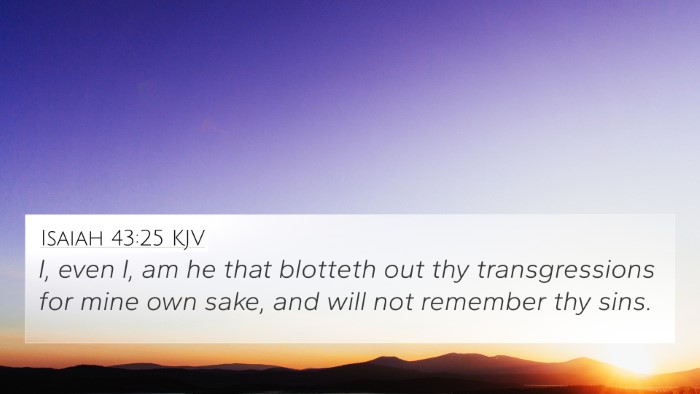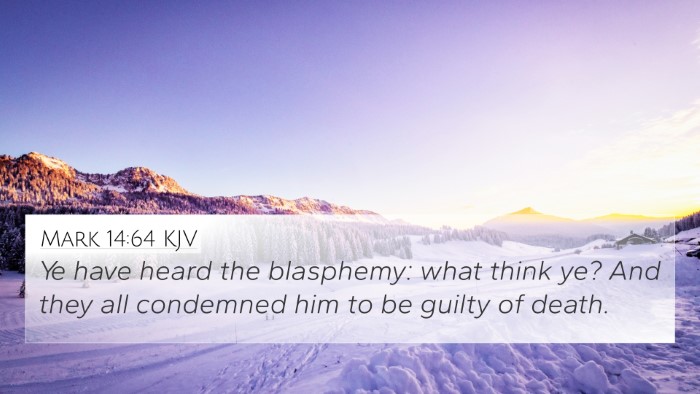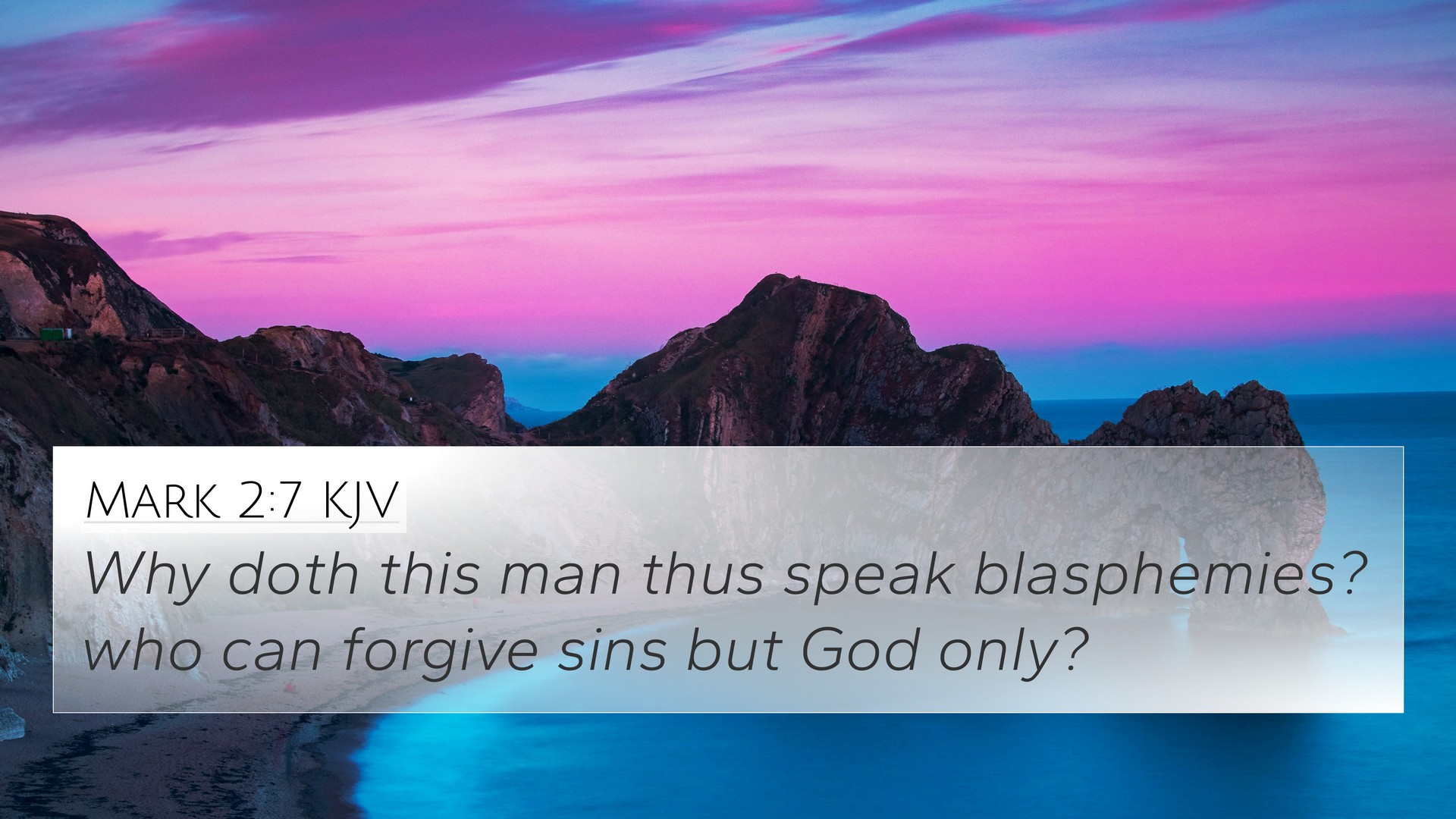Old Testament
Genesis Exodus Leviticus Numbers Deuteronomy Joshua Judges Ruth 1 Samuel 2 Samuel 1 Kings 2 Kings 1 Chronicles 2 Chronicles Ezra Nehemiah Esther Job Psalms Proverbs Ecclesiastes Song of Solomon Isaiah Jeremiah Lamentations Ezekiel Daniel Hosea Joel Amos Obadiah Jonah Micah Nahum Habakkuk Zephaniah Haggai Zechariah MalachiMark 2:7 Similar Verses
Mark 2:7 Cross References
Why doth this man thus speak blasphemies? who can forgive sins but God only?
Uncover the Rich Themes and Topics of This Bible Verse
Listed below are the Bible themes associated with Mark 2:7. We invite you to explore each theme to gain deeper insights into the Scriptures.
Mark 2:7 Cross Reference Verses
This section features a detailed cross-reference designed to enrich your understanding of the Scriptures. Below, you will find carefully selected verses that echo the themes and teachings related to Mark 2:7 KJV. Click on any image to explore detailed analyses of related Bible verses and uncover deeper theological insights.

Isaiah 43:25 (KJV) »
I, even I, am he that blotteth out thy transgressions for mine own sake, and will not remember thy sins.

Daniel 9:9 (KJV) »
To the Lord our God belong mercies and forgivenesses, though we have rebelled against him;

Micah 7:18 (KJV) »
Who is a God like unto thee, that pardoneth iniquity, and passeth by the transgression of the remnant of his heritage? he retaineth not his anger for ever, because he delighteth in mercy.

Luke 5:21 (KJV) »
And the scribes and the Pharisees began to reason, saying, Who is this which speaketh blasphemies? Who can forgive sins, but God alone?

Luke 7:49 (KJV) »
And they that sat at meat with him began to say within themselves, Who is this that forgiveth sins also?

Mark 14:64 (KJV) »
Ye have heard the blasphemy: what think ye? And they all condemned him to be guilty of death.

John 10:36 (KJV) »
Say ye of him, whom the Father hath sanctified, and sent into the world, Thou blasphemest; because I said, I am the Son of God?

John 20:20 (KJV) »
And when he had so said, he shewed unto them his hands and his side. Then were the disciples glad, when they saw the LORD.

John 10:33 (KJV) »
The Jews answered him, saying, For a good work we stone thee not; but for blasphemy; and because that thou, being a man, makest thyself God.

Matthew 9:3 (KJV) »
And, behold, certain of the scribes said within themselves, This man blasphemeth.

Matthew 26:65 (KJV) »
Then the high priest rent his clothes, saying, He hath spoken blasphemy; what further need have we of witnesses? behold, now ye have heard his blasphemy.
Mark 2:7 Verse Analysis and Similar Verses
Understanding Mark 2:7: Insights from Public Domain Commentaries
Mark 2:7 reads: "Why does this man speak blasphemies like these? Who can forgive sins but God alone?" This verse raises significant theological questions and brings forth themes of authority, belief, and divine rights. Below is a summarized interpretation combining insights from notable biblical commentators such as Matthew Henry, Albert Barnes, and Adam Clarke.
Contextual Background
In Mark 2, Jesus is in Capernaum where he heals a paralytic that was lowered through the roof by his friends. The Pharisees and scribes, present in the room, challenge Jesus's authority to forgive sins, making this moment pivotal in understanding Jesus's divine authority.
Commentary Insights
Matthew Henry's Commentary
Matthew Henry emphasizes the significance of the scribes' accusation of blasphemy against Jesus. He points out that their assertion reflects their misunderstanding of Jesus's identity and mission. Henry elaborates on the idea that the teachers of the law were correctly identifying that only God can forgive sins, yet failing to recognize Jesus as God incarnate.
Albert Barnes's Notes
Barnes offers an analytical approach, considering the Pharisees' perspective. He notes that their question hints at a deeper spiritual blindness. They were so entrenched in their own legalistic interpretations that they failed to see the grace and mercy symbolized in Jesus's actions. Barnes highlights the contrast between human regulations and divine authority, underlining that Jesus has the power to forgive sins, an act that could only be performed by God.
Adam Clarke's Commentary
Clarke brings in the historical context of blasphemy laws and underscores the seriousness of the charge made against Jesus. He discusses the implications of claiming that he could forgive sins, stating that such claims were revolutionary considering the existing Jewish views of divine authority and forgiveness.
Theological Implications
This verse not only addresses the authority of Jesus but also touches upon key theological themes that resonate throughout scripture. It invites readers to explore the nature of sin, forgiveness, and the divine right of Jesus as the Savior. This passage serves as a gateway into a deeper understanding of the connections between forgiveness in the Old Testament and the New Testament’s teachings on grace.
Cross References
Here are some Bible cross-references related to Mark 2:7:
- Isaiah 43:25: “I, even I, am he who blots out your transgressions for my own sake, and remembers your sins no more.”
- Matthew 9:2: “Take heart, son; your sins are forgiven.”
- Luke 5:21: “The Pharisees and the teachers of the law began thinking to themselves, ‘Who is this fellow who speaks blasphemy? Who can forgive sins but God alone?’”
- John 10:33: “...we are not stoning you for any good work... but for blasphemy, because you, a mere man, claim to be God.”
- Colossians 3:13: “Bear with each other and forgive one another if any of you has a grievance against someone. Forgive as the Lord forgave you.”
- 1 John 1:9: “If we confess our sins, he is faithful and just and will forgive us our sins and purify us from all unrighteousness.”
- Psalms 103:12: “As far as the east is from the west, so far has he removed our transgressions from us.”
Connections Between Bible Verses
This verse establishes profound connections between various themes across scripture:
- Authority: The authority of Jesus is a recurring theme; see also Matthew 28:18, where Jesus asserts, “All authority in heaven and on earth has been given to me.”
- Forgiveness: The theme of forgiveness is echoed throughout the Bible, especially in Luke 24:47, which discusses repentance and forgiveness in His name.
- Divine vs Human Authority: The challenge of human authority versus divine authority resonates with passages like Acts 4:12, affirming that salvation is found in no one else but Jesus.
Conclusion: The Importance of Cross-Referencing
Understanding Mark 2:7 within the broader scriptural context provides richer depth to our reading of the Bible. The connections between verses can unveil the cohesive narrative of God’s grace and the authority of Christ across both the Old and New Testaments.
Utilizing tools for Bible cross-referencing, such as concordances and Bible reference resources, enhances one's study of scripture. Recognizing the inter-Biblical dialogue can deepen our faith and understanding of God's word.
Further Study Suggestions
For those seeking to delve deeper into comparative Bible verse analysis, consider the following:
- Explore how different Gospels convey the theme of forgiveness.
- Investigate the connections between the teachings of Jesus and the Old Testament Prophets.
- Utilize cross-reference guides for sermon preparation and personal study.




